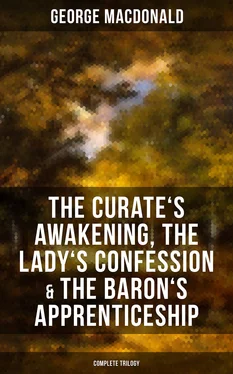"I think that COULD be!" said the curate, breaking the silence that followed when Rachel ceased.
"Not in this world," said the draper.
"To doubt that it COULD be," said the gatekeeper, "would be to doubt whether the kingdom of heaven is a chimera or a divine idea."
CHAPTER XXIX.
POLWARTH AND LINGARD.
Table of Contents
The morning after Wingfold's second visit, Lingard, much to his sister's surprise, partly to her pleasure, and somewhat to her consternation, asked for his clothes: he wanted to get up. So little energy had he hitherto shown, so weak was he, and so frequent had been the symptoms of returning fever, that the doctor had not yet thought of advising more than an hour's sitting while his bed was made comfortable. And Helen had felt that she had him, if not safe, yet safer in bed than he could be elsewhere.
His wish to rise was a sign that he was getting better. But could she wish him to get better, seeing every hour threatened to be an hour of torture? On the other hand, she could not but hope that, for the last day or so, his mind had been a little more at ease. Assuredly the light in his eye was less troubled: perhaps he saw prospect of such mental quiet as might render life endurable.
He declined assistance, and Helen, having got him everything he required, left the room to wait within hearing. It took him a long time to dress, but he had resolved to do it himself, and at length called Helen.
She found he looked worse in his clothes—fearfully worn and white! Ah, what a sad ghost he was of his former sunny self! Helen turned her eyes from him, that he might not see how changed she thought him, and there were the trees in the garden and the meadows and the park beyond, bathing in the strength of the sun, betwixt the blue sky and the green earth! "What a hideous world it is!" she said to herself. She was not yet persuaded, like her cousin, that it was the best possible world—only that, unfortunately, not much was possible in worlds.
"Will you get me something, Helen," he said. "Mr. Wingfold will be here, and I want to be able to talk to him."
It was the first time he had asked for food, though he had seldom refused to take what she brought him. She made him lie on the couch, and gave orders that, if Mr. Wingfold called, he should be shown up at once. Leopold's face brightened; he actually looked pleased when his soup came. When Wingfold was announced, he grew for a moment radiant.
Helen received the curate respectfully, but not very cordially: SHE could not make Leopold's face shine!
"Would your brother like to see Mr. Polwarth?" asked the curate rather abruptly.
"I will see anyone you would like me to see. Mr. Wingfold," answered Liugard for himself, with a decision that clearly indicated returning strength.
"But, Leopold, you know it is hardly to be desired," suggested Helen, "that more persons—"
"I don't know that," interrupted Leopold with strange expression.
"Perhaps I had better tell you, Miss Lingard," said the curate, "that it was Mr. Polwarth who found the thing I gave you. After your visit, he could not fail to put things together, and had he been a common man, I should have judged it prudent to tell him for the sake of secrecy what I have told him for the sake of counsel. I repeat in your brother's hearing what I have said to you, that he is the wisest and best man I have ever known.—I left him in the meadow at the foot of the garden. He is suffering to-day, and I wanted to save him the longer walk. If you will allow me, I will go and bring him in."
"Do," said Leopold. "Think, Helen!—If he is the wisest and best man Mr. Wingfold ever knew! Tell him where to find the key."
"I will go myself," she said—with a yielding to the inevitable.
When she opened the door, there was the little man seated a few yards off on the grass. He had plucked a cowslip and was looking into it so intently that he neither heard nor saw her.
"Mr. Polwarth!" said Helen.
He lifted his eyes, rose, and taking off his hat, said with a smile,
"I was looking in the cowslip for the spots which the fairy, in the Midsummer Night's Dream, calls 'rubies.'—How is your brother, Miss Lingard?"
Helen answered with cold politeness, and led the way up the garden with considerably more stateliness of demeanour than was necessary.
When he followed her into the room, "This is Mr. Polwarth, Leopold," said the curate, rising respectfully. "You may speak to him as freely as to me, and he is far more able to give you counsel than I am."
"Would you mind shaking hands with me, Mr. Polwarth?" said Leopold, holding out his shadowy hand.
Polwarth took it with the kindest of smiles, and held it a moment in his.
"You think me an odd-looking creature—don't you?" he said; "but just because God made me so, I have been compelled to think about things I might otherwise have forgotten, and that is why Mr. Wingfold would have me come to see you."
The curate placed a chair for him, and the gate-keeper sat down. Helen seated herself a little way off in the window, pretending, or hardly more, to hem a handkerchief. Leopold's big eyes went wandering from one to the other of the two men.
"What a horrible world it is!" was the thought that kept humming on like an evil insect in Helen's heart. "I am sorry to see you suffer so much," said Leopold kindly, for he heard the laboured breath of the little man, and saw the heaving of his chest.
"It does not greatly trouble me," returned Polwarth. "It is not my fault, you see," he added with a smile; "at least I don't think it is."
"You are happy to suffer without fault," said Leopold. "It is because it is just that my punishment seems greater than I can bear."
"You need God's forgiveness in your soul."
"I don't see how that should do anything for me."
"I do not mean it would take away your suffering; but it would make you able to bear it. It would be fresh life in you."
"I can't see why it should. I can't feel that I have wronged God. I have been trying to feel it, Mr. Wingfold, ever since you talked to me. But I don't know God, and I only feel what I have done to Emmeline. If I said to God, 'Pardon me,' and he said to me, 'I do pardon you,' I should feel just the same. What could that do to set anything right that I have set wrong? I am what I am, and what I ever shall be, and the injury which came from me, cleaves fast to her, and is my wrong wherever she is."
He hid his face in his hands.
"What use CAN it be to torture the poor boy so?" said Helen to herself.
The two men sat silent. Then Polwarth said:
"I doubt if there is any use in trying to feel. And no amount of trying could enable you to imagine what God's forgiveness is like to those that have it in them. Tell me something more you do feel, Mr. Lingard."
"I feel that I could kill myself to bring her back to life."
"That is, you would gladly make amends for the wrong you have done her."
"I would give my life, my soul, to do it."
"And there is nothing you can do for it?"
Helen began to tremble.
"What is there that can be done?" answered Leopold. "It does seem hard that a man should be made capable of doing things that he is not made capable of undoing again."
"It is indeed a terrible thought! And even the smallest wrong is, perhaps, too awful a thing for created being ever to set right again."
"You mean it takes God to do that?"
"I do."
"I don't see how he ever could set some things right."
"He would not be God if he could not or would not do for his creature what that creature cannot do for himself, and must have done for him or lose his life."
"Then he isn't God, for he can't help me."
"Because you don't see what can be done, you say God can do nothing—which is as much as to say there cannot be more within his scope than there is within yours! One thing is clear, that, if he saw no more than what lies within your ken, he could not be God. The very impossibility you see in the thing points to the region wherein God works."
Читать дальше












